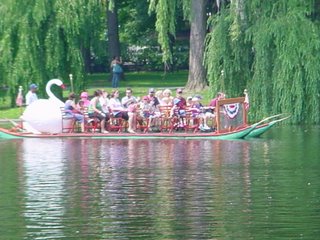J. S. Henslow's Boring Life
 Nothing beats a ride on the Swan Boats, don't ya think? If you look carefully, you can see me, my lovely sister-in-law, Hanne and four of our collective children....
Nothing beats a ride on the Swan Boats, don't ya think? If you look carefully, you can see me, my lovely sister-in-law, Hanne and four of our collective children....I finally finished the biography of JS Henslow and have a few observations:
First, yes, JS Henslow led a boring life. At least it was boring in the biographical sense. He spent many years as a Cambridge professor and (snore) a rather involved-for-the-time parish Rector (Hitcham) in the Church of England. Henslow was interested in many things. He was a scientist and an educational reformer. However, while he wasn't bored, there is no great trip to the Americas (he turned down the post on the Beagle and recommended his protege Charles Darwin). There were, in fact, few specific moments that indicate his substantial contributions. Both academia and the ministry can be that way. Science certainly is. There are baby steps. There are letters and ideas first read by a few and then by more as facts are found to support (or refute) theory.
In fact, trips to parks and around the local countryside composed the bulk of his field research. He was an expert on where he lived. This is nice to think of while cruising about the "Common" and the "Garden" on a hot summer day. It certainly is encouragement to continue getting the ol' canoe out on the river! Also, I should dig up the plant press...
Darwin once put Henslow's life this way: With respect to a biography of Henslow, I cannot help feeling rather doubtful, on the principle that a biography could not do him justice...I cannot help fearing his life might turn out flat. There can hardly be marked incidents to describe.
He said this in a letter to Joseph Hooker encouraging him to seek out "vivid materials to describe his life as a parish-priest" This is, actually, the most interesting aspect of the book I read (Darwin's Mentor, by S.M. Walters and E.A. Stow). I have always been curious about what it was like for these gentleman (clergyman)-scholars and what life was like for them at work in the parish and when relating to their colleagues in the church.
Life in the parish seems, in fact, to be quite similar. I am not sure, however, that we would have quite as many folks at Eliot sign up for day-long field trips! This was an important part of his program to educate the congregation about natural history and the humanities. It also appears to be one of the more popular parts of his program. One difference is that Henslow also had to serve in a judicial capacity from time to time. Needless to say this created a strain in relations with a portion fo his flock!
Again, his relations with his religious colleagues sounded familiar. Every denomination or religious institution--even the liberal ones--has its share of traditionalists and establishment enforcers. There are always people who are opposed to those who may posess a perspective that differs from the norm. Henslow's interests, both political and religious (he was a Whig and an acknowledged liberal Christian) disturbed quite a few people. This is something that didn't seem to bother him. In fact it may have provided some excitement in his life!
Henslow was well-liked amongst scientists, however. Some of them named things after him. Notably there is a sea-cucumber and a crab. In the New World he is memorialized through the now rare Henslow's Sparrow.
I will leave you with a story from JS Henslow's son, George. He was a Botanist and priest like his father. "A clergyman once said to me at a clerical meeting: 'Hitcham never knew what Christianity was till your father died.' I thought silence was the best reply; but it seemed to me that the speaker was somewhat wanting in Christian spirit himself".

<< Home